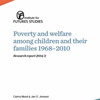surveys29
The Oxford Handbook of Analytical Sociology
2009. Oxford University Press. Table of Contents Foundations1: Peter Hedström and Peter Bearman: What is analytical sociology all about? An introductory essay by Peter Hedström2: Peter Hedström and Lars Udéhn:
Estimating Social and Ethnic Inequality in School Surveys: Biases from Child Misreporting and Parent Nonresponse
European Sociological Review 31: 312-25. Abstract We study the biases that arise in estimates of social inequalities in children’s cognitive ability test scores due to (i) children’s misreporting of soci
What do immigrants know about Sweden?
The degree of trust in a country has proven to be important for many reasons. The population in the Nordic countries has far higher levels of trust than the rest of the world. Studies show that migran
A Bedrock of Support? Trends in Welfare State Attitudes in Sweden, 1981–2010
Social Policy & Administration issn 0144–5596. DOI: 10.1111/j.1467-9515.2011.00796.x. Vol. 45, No. 7, December 2011, pp. 806–825 AbstractThis article reports findings about Swedes’ attitudes toward
Different Populations Agree on Which Moral Arguments Underlie Which Opinions
Frontiers in Psychology AbstractPeople often justify their moral opinions by referring to larger moral concerns (e. g., “It isunfairif homosexuals are not allowed to marry!” vs. “Letting homosexuals matraditions!”). Is there a general agreement about what concerns apply to different moral opinions? We used surveys in the United States and the United Kingdom to measure the perceived applicability of eight concerns (harm, violence, fairness, liberty, authority, ingroup, purity, and governmental overreach) to a wide range of moral opinions. Within countries, argument applicability scores were largely similar whether they were calculated among women or men, among young or old, among liberals or conservatives, or among people with or without higher education. Thus, the applicability of a given moral concern to a specific opinion can be viewed as an objective quality of the opinion, largely independent of the population in which it is measured. Finally, we used similar surveys in Israel and Brazil to establish that this independence of populations also extended to populations in different countries. However, the extent to which this holds across cultures beyond those included in the current study is still an open question.

How do social norms change?
Social norms change all the time, in all societies. But what determines which norms change and which norms do not?
Discounting for Public Policy: A Survey
Economics and Philosophy 33(3), pp. 391-439. Published online 31 May 2017. doi.org/10.1017/S0266267117000062 Abstract This article surveys the debate over the social discount rate. The focus is on the ec

Poverty and welfare among children and their families 1968–2010
Research report 2014/2, 78 p. This report studies child poverty, and changes in such poverty both by analyzing the family economy, and directly by using surveys with children themselves. It also compar
Diversity preferences among employees and ethnoracial workplace segregation
Social Science Research. doi.org/10.1016/j.ssresearch.2018.03.009 Abstract Ethno-racial workplace segregation increases already existing ethno-racial inequality. While previous research has identified d

A lost generation? A study of long-term influence of the COVID-19 pandemic on business students and their career networks
What impact did the pandemic have on business students' social networks, and how will it impact their career possibilities?








